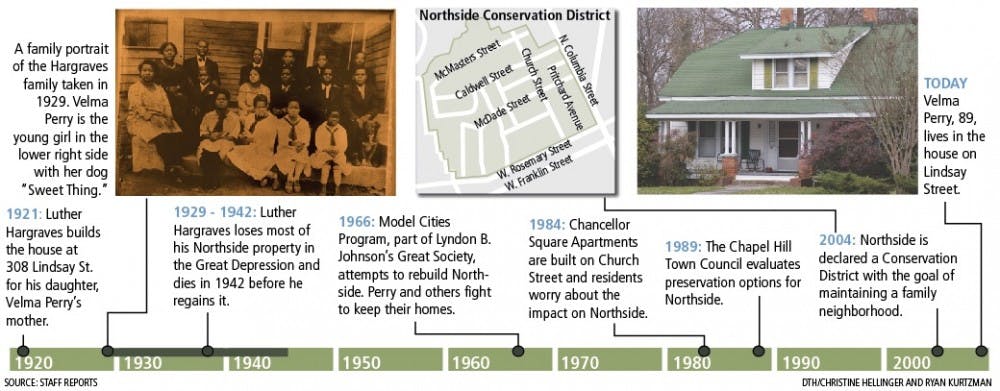But now, the dynamic has shifted.
“Fifty and 100 years ago, St. Paul’s was down the block from its membership,” Carrboro Mayor Mark Chilton said. “That’s not as true today as it was.”
St. Paul’s now draws members from Chatham, Durham and even Guilford counties.
Where many members used to walk to church in the morning, now almost all of the 200-plus members drive.
St. Paul’s 30-car parking lot is filled nearly every Sunday, and cars line North Merritt Mill Road.
The Rev. Thomas Nixon recognized those changes.
Appointed to St. Paul’s in 2004, Nixon brought a unique energy to leading the historic church.
“I take the approach as the church being a part of a solution to whatever the problems of the community are or may be,” Nixon said. “And not being a place for this whole conversation about what’s wrong.”
Nixon recognized that the church was bursting at the seams, and he and the church implemented plans to move campuses.
But 145 years of history in the same building does not uproot easily.
“This church has been here, on this one piece of property for 145 years,” Nixon said. “That is very emotional, and I understood that, and I was very sympathetic with that.
“As passionate as we are about that, speaking from a spiritual aspect, this building nor property is the church. Now for some people that’s a hard statement. For some that’s being cold-hearted.”
To get the day's news and headlines in your inbox each morning, sign up for our email newsletters.
Moving the community
Nixon found a kindred spirit in his next-door neighbor, Thomas Tucker, who owns Carolina Car Wash & Detail at the same intersection.
But Tucker is also a developer active in the community. His name crops up on many advisory boards in Chapel Hill. He headed the development of Rosemary Village and also is a member of the Rogers Road Small Area Plan Task Force.
A resident of the historically black and low-income Rogers Road community, Tucker was well aware of the problems there.
The community is just beyond the urban services boundary for water and sewer, and residents worry their wells are contaminated by the county landfill in the neighborhood.
With low-cost housing like Habitat for Humanity’s development moving into the area, Tucker felt the community needed a stabilizing force — like an expansive church complex.
Tucker knew Nixon and St. Paul’s were searching for a new location. He took the reverend out to a plot owned by his family at the corner of Rogers Road and Purefoy Drive.
Nixon recognized immediately this was where he wanted St. Paul’s to be.
“When I saw the property, I said to myself, ‘Wow. This is it,’” Nixon said. “‘This is the vision.’”
And when Tucker offered St. Paul’s the land at an affordable price, the discount was too good to pass up.
In late 2007, St. Paul’s purchased 23 acres, valued at more than $600,000, from Tucker for its new campus.
Building the vision
The vision manifested itself into St. Paul’s plans for a multimillion dollar project on the Rogers Road plot.
“We can’t afford it, but we’ll do it anyway,” Tucker said. “Because in the long run I think it’s best for the community.”
The plans include an expansive church facility, youth and senior centers, a gymnasium and athletic fields — along with affordable housing surrounding the church.
The recreation facilities St. Paul’s brings, in particular, will benefit the area’s youth. There is no park currently, nor are there day care facilities that St. Paul’s new campus could provide, Tucker said.
“Everything we’re talking about building, if it was built today, it would be utilized,” Nixon said.
When the four-phase building plans are finished, it will be a community in and of itself. And it’s in the middle of a growing part of Chapel Hill.
It’s an undertaking that looks toweringly tall for a church that, despite its history and its recent growth, still has a relatively small congregation.
“Yes, it’s very ambitious and may be a little crazy,” Nixon said. “But for me, set a goal higher than you can attain, and when you attain it, you look back and say, ‘Whew. God sure enough was in the midst of that.’”
Contact the City Editor at citydesk@unc.edu.




